Dental Implants Pantego
Seamlessly Completing Pantego Smiles

Losing one or more teeth can be a devastating blow to your self-confidence, oral health, and overall quality of life. Thankfully, dental implants in Pantego can transform a lacking smile for the better, seamlessly restoring strength and natural beauty.
With the help of a board-certified in-house specialist here at South Arlington Dental Care, Dr. Prachi Shah often provides the entire dental implant procedure in one convenient location, taking you through impressions, placement, and restoration in a familiar, comfortable environment. We can’t wait for you to see the incredible results that dental implants create! Contact our Pantego, TX, practice today to schedule a dental implant consultation. Our team welcomes patients from nearby areas, including Fort Worth, Burleson, Grand Prairie, Mansfield, and beyond.
Why Choose South Arlington Dental Care for Dental Implants?
- Start-to-Finish Dental Implant Treatment in One Office
- Able to Replace Any Number of Missing Teeth for a Lifetime
- Low-Interest Dental Financing Available
What Are Dental Implants?
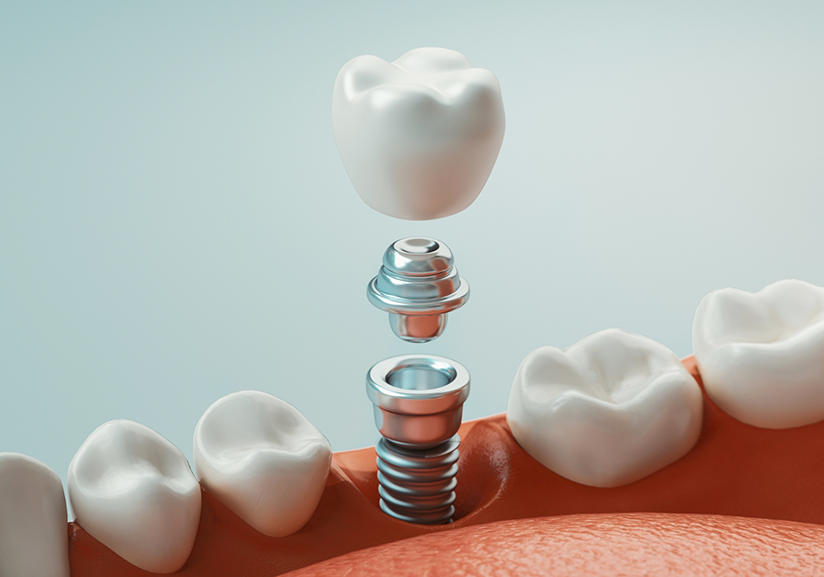
A dental implant is a small titanium cylinder meant to recreate the root of a tooth, which is normally hidden below the gums. Once the implant is surgically placed in the jawbone, it essentially becomes a new tooth root by fusing to the bone in a process called osseointegration. Afterward, we can place metal abutments on top of the implant posts, which allows us to complete your smile by securing a custom dental crown, bridge, or denture to the abutments.
Without a root in place to stimulate the jawbone, even patients who have had their teeth restored with dental bridges or dentures experience facial deterioration and a higher risk of additional bone and tooth loss. Because dental implants function like real tooth roots, they revitalize oral health and help patients avoid these concerns for a more satisfying result overall.
The 4-Step Dental Implant Process
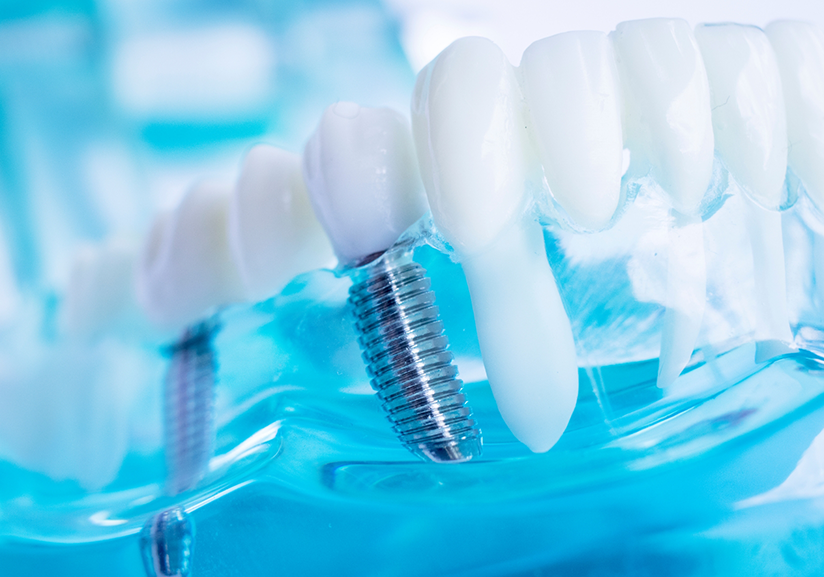
The process of getting dental implants is different for every patient. Dr. Shah, your implant dentist in Pantego, will walk you through your unique treatment plan in detail so you know exactly what you can expect. This will help ease any anxieties that you have and allow you to focus your energy on looking forward to enjoying your new smile. While getting dental implants takes longer than getting a conventional bridge or denture, the impressive longevity of this treatment makes it worth the wait. If you take good care of your new teeth, they could potentially last a lifetime!
Initial Dental Implant Consultation
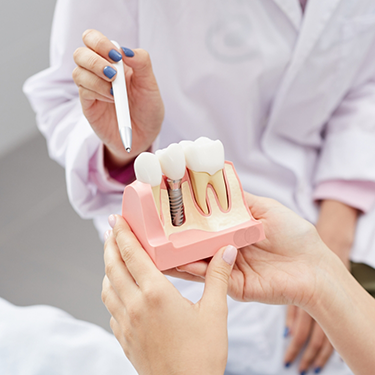
The first step of every dental implant treatment is the initial consultation. During this visit, our team at South Arlington Dental Care will collect X-rays of your mouth and conduct a thorough examination of your teeth and gums. Then, Dr. Shah will discuss some of the goals you have throughout the process, as well as your medical history. All of this information will help us determine whether dental implants in Pantego are the right option for you. Once you decide to move forward, we’ll walk you through a customized treatment plan and schedule your next appointment.
In-House Dental Implant Surgery

Dr. Shah has her Doctor of Dental Surgery (DDS) degree from New York University College of Dentistry and has completed countless continuing education courses in numerous specialties, including dental implants. This allows her to complete the entire dental implant procedure under one roof, including the surgery. Typically, only sedation is needed when placing dental implants, and many of our patients can return to their regular routines the day after their procedure. However, everybody is different, so be sure to reserve some time for proper recovery.
Osseointegration & Abutment Period
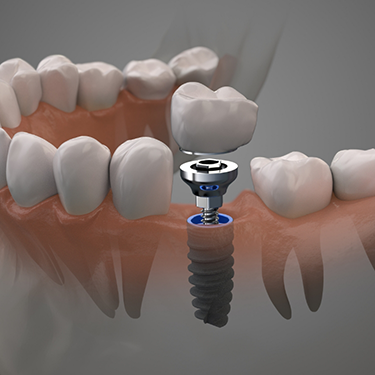
Over the next several months after your surgery, you’ll undergo a process called osseointegration. This is crucial to the success of your implants and involves them chemically fusing with your jawbone, just like your natural tooth roots once were. Once that’s complete, we’ll call you back in to place small, metal connector pieces onto your implants, called abutments.
Placement of the Final Restoration
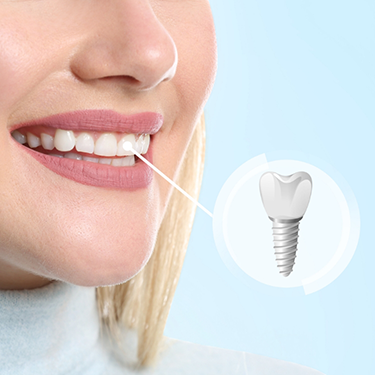
As soon as we receive your final restoration, we’ll schedule your last appointment with us to complete your treatment. Your restoration will be specially designed so that it attaches to the abutments we previously placed. Once everything is securely in place, you can enjoy benefits like enhanced chewing and speaking abilities as well as replacement teeth that look and feel completely natural.
Benefits of Dental Implants

More than five million Americans currently have dental implants, and that number is growing by hundreds of thousands a year. Once you understand the benefits that dental implants provide, it’s not hard to see why they’re so popular. By rebuilding the entire structure of the tooth from the root up through the crown, dental implants can offer security, reliability, and longevity that other options simply cannot deliver. Keep reading to learn more about their benefits in greater detail!
Day-to-Day Benefits

- Eat your favorite foods with ease: When the time comes to enjoy a thick cut of steak, a crisp apple, corn on the cob, a handful of mixed nuts, or any other food, dental implants can break it down just as well as natural teeth.
- Speak clearly: It’s surprising how much you rely on your teeth to say certain words without realizing it. Dental implants ensure you can speak to friends, family, and anyone else with the confidence that your teeth will stay in place, not shift and slide along the way.
- Easy at-home oral hygiene: Taking care of your dental implants is important, but it doesn’t have to be difficult. Simply brush and floss as normal as well as maintain regular checkups to keep your new smile healthy.
Health Benefits

- Preserve your jawbone: The moment a tooth is lost, the bone tissue responsible for holding it in place begins to break down. This can cause changes in the shape of your jaw, affecting your facial appearance.
- Prevent future tooth loss: As bone tissue breaks down, the integrity of the jawbone begins to dwindle, putting neighboring teeth at risk of coming out as well. By replacing teeth with dental implants, you dramatically reduce your risk of future tooth loss.
- Maintain a healthier diet: Eating a balanced meal is generally much easier when you can eat the foods you enjoy. A healthier diet means a better quality of life overall!
Long-Term Benefits

- High success rate: When placed by a professional, you can expect your dental implants to remain healthy and functional for many years to come. On average, they hold a success rate as high as 98%, particularly in patients who do not use tobacco products.
- Youthful appearance: Having a complete smile is largely associated with youth, but that’s not the only cosmetic benefit dental implants provide. They also ensure healthy blood flow to your cheeks once they’ve been integrated, ensuring your face does not sag and your cheeks don’t become hollow.
- True longevity: On average, dental implants have a lifespan of about 30+ years. Of course, you’ll need to take proper care of them every day to ensure they last. Many patients can enjoy their tooth replacements for the rest of their lives! This is rarely the case for bridges or dentures, both of which need replacement much sooner than dental implants.
Who Dental Implants Can Help

As the most versatile tooth loss solution by far, dental implants can bring back any number of missing teeth. Depending on your unique preferences and oral health circumstances, Dr. Shah may recommend one of the following dental implant treatments:
Missing One Tooth
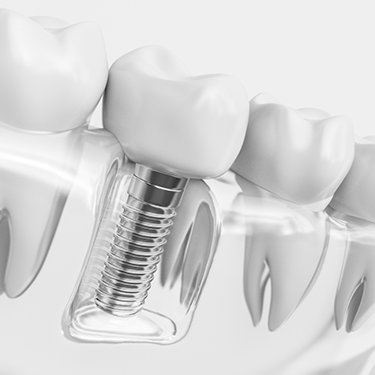
When reconstructing a single tooth, a quality, all-ceramic dental crown placed that is placed on top of an implant post can do the job without forcing patients to sacrifice the health of remaining teeth in the way that dental bridges do.
Missing Multiple Teeth
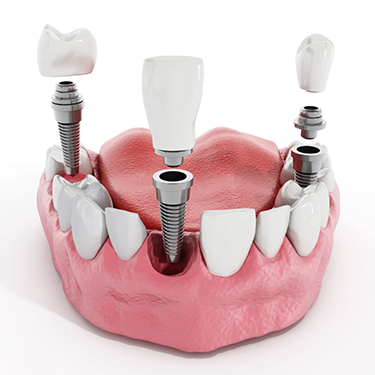
For several missing teeth, a fixed implant-supported bridge may also be considered. This type of bridge is permanently secured onto two implants, each of which is located at the end of the gap in your smile. This solution stimulates jawbone growth and restores chewing function.
Missing All Teeth
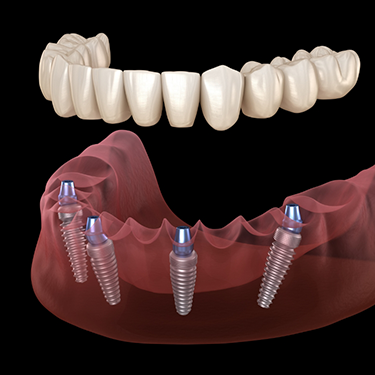
In the most extensive tooth loss cases, our team typically recommends an implant denture. This prosthetic is similar to a traditional denture, with one significant difference – it’s designed to attach over a small number of implants, giving patients a more secure fit overall.
Learn More About Implant Dentures
Understanding the Cost of Dental Implants

The cost of dental implants is balanced out by the various benefits they offer – improved health, improved confidence, a stronger smile, and overall higher quality of life. The final price of the treatment will be determined by many different factors that we’ll discuss at your consultation. Below are some of the factors that will typically have to be taken into account when creating a price estimate for a dental implant treatment.
Preliminary Treatments & Dental Implant Surgery

Right off the bat, we need to determine if any preliminary treatments are necessary. This might include gum disease therapy or bone grafts to address health issues that could otherwise prevent a successful implant placement. Each treatment will incur its own cost, which will be brought to your attention right away.
Of course, dental implant surgery has costs of its own to consider. One advantage of going to South Arlington Dental Care for dental implants is that our practice places the posts and restores them, so you pay all of the relevant fees under one roof; you don’t have to make a separate payment to an out-of-practice oral surgeon.
The Parts of Your Dental Implant
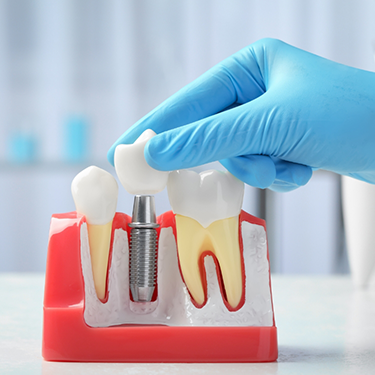
How much do the dental implants themselves cost? This is not an easy question to give a general answer to, because, in addition to having to consider the material of the implants themselves, we also have to consider the number of implants needed. You might only need a single implant to replace one tooth, or you might need several implants to support a denture. Also, once the implant post has joined with the jawbone, a piece called the abutment is attached, and that process will also come with its own cost.
Final Dental Implant Restoration
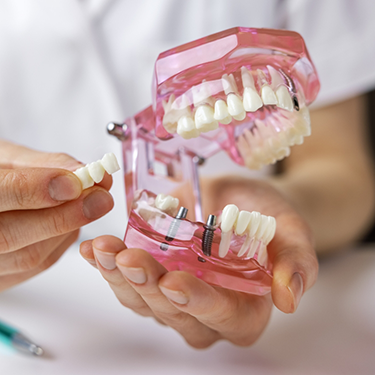
One of the most influential factors in the final cost will be the type of implant restoration you receive. Generally speaking, you’ll be getting one of the following options:
- A dental crown supported by a single implant post.
- A dental bridge resting on a pair of implants.
- Partial dentures that attach to a specific number of implants depending on which teeth need to be replaced.
- Full dentures that are supported by four to eight posts. (Note that in some cases, you may be getting implant dentures for both the upper and lower arches.)
Does My Dental Insurance Cover Dental Implants?

Dental implant treatment often is not a benefit under many dental insurance plans. However, if we review your benefits with you, we might find that certain parts of the implant treatment can be covered under your plan. For example, many insurance carriers will help pay for the implant restoration even if they don’t cover the implant itself. It’s important that you fully understand what sort of coverage you’re entitled to before moving forward; if you have any doubts, you can call your insurance carrier directly.
Making Dental Implants Affordable

South Arlington Dental Care gives you multiple options to explore to lower the cost of dental implants. Call today to learn about our VIP Savings Plan, which offers discounts for a wide variety of procedures at our practice. We can also help you apply for an affordable financing plan through Sunbit, Cherry, or CareCredit. We want you to get the most out of your new smile, but you shouldn’t have to break the bank to do so; don’t hesitate to call us to discuss your financial options.
Dental Implant FAQs
How long do dental implants last?
It is not unusual for dental implants to thrive for 30 years or longer under the right circumstances. The lifespan of your new smile will rely on your health and lifestyle. You can ensure your new teeth last for decades by committing to your oral hygiene at home and visiting your dentist at least twice a year for a cleaning and checkup. Your implant dentist in Pantego also recommends avoiding anything that may damage them, like hard or sticky foods, using your teeth as tools, or chewing on inedible objects. With a proactive approach to safeguarding your smile, you won’t have to worry about replacing your teeth every few years, like traditional bridges and dentures. You’ll save money in the long term because your dental implants can serve you for a lifetime by practicing good oral hygiene and seeing your dentist regularly.
Are dental implants removable?
Titanium posts are surgically placed into your jawbone to serve as roots. Your bone will fuse to them through a process called osseointegration. As a result, only a dental professional can take them out, such as if implant failure occurs. However, some implant dentures can be removed for cleaning, but your posts and abutments will stay in place.
Does getting dental implants hurt?
Despite needing oral surgery, you don’t need to dread a painful procedure. Sedation or anesthesia are used, so your body won’t register pain. Your mouth will also be numbed using a local anesthetic to keep you comfortable. It’s normal for your mouth to be a bit tender for a few days post-op, but you can manage it using any prescribed or OTC pain relievers recommended by your dentist. You can also apply a cold compress to the outside of your face to numb the area, which will also help minimize any swelling or bruising. It’s best to stick to a soft diet for a few days until your tenderness subsides. If your pain worsens or doesn’t improve after 2-3 days, contact our office for further instructions.
Are dental implants safe?
Dental implants are the most reliable option to replace missing teeth. They have a high success rate when used by the ideal candidate and when placed by a qualified dentist. You’ll undergo a thorough consultation to assess your oral and general health to look for any potential concerns. It’s not uncommon to need additional procedures to ensure your smile is healthy to support the posts, such as periodontal therapy or bone grafting. If you have certain medical conditions or take specific medications that compromise your ability to heal or fight infections, your dentist will take precautions to protect your safety and the success of your new smile.
Do I Need a Bone Graft Before Getting Dental Implants?
A preliminary bone graft is only needed when there isn’t enough jawbone density to support the desired number of dental implants, so not everyone will need one. However, since jawbone deterioration is a natural side effect of tooth loss, you will likely need one if you are missing many teeth or have been dealing with tooth loss for a long time. During your consultation, we’ll inspect your jawbone density and compare it to how many dental implants you need to determine if a bone graft is necessary. While this preparatory procedure will add time and money to your treatment plan, it’s essential for maximizing your chances of long-term success!
Am I Too Young to Get Dental Implants? Am I Too Old to Get Dental Implants?
While tooth loss is certainly more common with age, younger and older patients alike may find themselves in need of replacing missing teeth. Since dental implants are embedded into the jawbone, a patient needs to have a fully developed jaw to get dental implants. Typically, this means the patient needs to be at least 18 years old. However, there is no upper age limit for dental implants! As long as you are in good enough shape to undergo minor surgery, have a healthy smile, and have adequate jawbone density, you can get dental implants no matter how old you are.
Can I Get Dental Implants If I Smoke?
Smoking negatively impacts your health in many ways, including your smile. Tobacco slows down your body’s natural healing process and can interfere with osseointegration, both of which can cause your dental implants to fail. This is why permanent prosthetics only have an 80% success rate among those who smoke. You can get dental implants if you smoke, but we will need to plan your treatment accordingly. Also, you will need to refrain from smoking for a minimum of two weeks before and after your dental implant surgery. Getting dental implants presents the perfect opportunity to kick this unhealthy habit!
Are Dental Implants Covered by Dental Insurance?
While every dental insurance policy is different, and dental implants are quickly becoming the most popular tooth replacement option, most dental insurance companies do not cover them. However, your policy will likely cover portions of your treatment. Our knowledgeable team will look over the details of your plan and ensure your benefits are being maximized. Often, dental insurance offers partial coverage for things like consultation, preliminary treatments, and final restoration. We’ll give you a personalized estimate of how much we expect your dental insurance to cover so there are no unpleasant surprises when it’s time to pay for your treatment. We’ll also go over all your financial options for making dental implants as affordable as possible.
I Need a Checkup & Cleaning I Need a Dentist for My Child I Have a Cavity or Broken Tooth I am Missing One or More Teeth I Want to Enhance My Smile I Want a Straighter Smile I Have a Dental Emergency I am Worried About Gum Disease I am Scared of the Dentist I Snore/Have Sleep Apnea View Our Services
